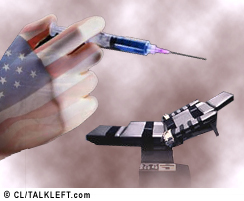"It's not about the prisoner. It's about public policy. It's about the audience [at the execution] and prison personnel who have to carry out the execution. It would be hard for everybody to have to sit and wait for the EKG activity to cease so they can declare the prisoner dead."
Other anesthesiologists disagree and say pentobarbitol would kill within a few minutes. It's now used in euthanasia of animals:
"The animal dies almost instantaneously, within a few seconds of the injection, probably less than a minute," said [Dr. Willie] Reed, director of a veterinary research center at the university. "It is used on cattle every week."
The problem lies with the first drug in the cocktail, the paralytic drug.
Dr. Mark Heath, an assistant professor of clinical anesthesiology at Columbia University in New York, said in a declaration submitted in the [Michael] Morales case that California's "selection of potassium chloride to cause cardiac arrest needlessly increases the risk that a prisoner will experience excruciating pain prior to execution."
Last October, the American Society of Anesthesiologists issued an advisory warning that the risk of experiencing awareness during surgery increases when the patient has a history of substance abuse and when the anesthesia is administered intravenously, an action noted in the Human Rights Watch report.
From the HRW report summary:
Each of the three drugs, in the massive dosages called for in the protocols, is sufficient by itself to cause the death of the prisoner. Within a minute after it enters the prisoner's veins, potassium chloride will cause cardiac arrest. Without proper anesthesia, however, the drug acts as a fire moving through the veins. Potassium chloride is so painful that the American Veterinary Medical Association prohibits its use for euthanasia unless a veterinarian establishes that the animal being killed has been placed by an anesthetic agent at a deep level of unconsciousness (a "surgical plane of anesthesia" marked by non-responsiveness to noxious stimuli).
Pancuronium bromide is a neuromuscular blocking agent that paralyzes voluntary muscles, including the lungs and diaphragm. It would eventually cause asphyxiation of the prisoner. The drug, however, does not affect consciousness or the experience of pain. If the prisoner is not sufficiently anesthetized before being injected with pancuronium bromide, he will feel himself suffocating but be unable to draw a breath--a torturous experience, as anyone knows who has been trapped underwater for even a few seconds. The pancuronium bromide will conceal any agony an insufficiently anesthetized prisoner experiences because of the potassium chloride. Indeed, the only apparent purpose of the pancuronium bromide is to keep the prisoner still, saving the witnesses and execution team from observing convulsions or other body movements that might occur from the potassium chloride, and saving corrections officials from having to deal with the public relations and legal consequences of a visibly inhumane execution. At least thirty states have banned the use of neuromuscular blocking agents like pancuronium bromide in animal euthanasia because of the danger of undetected, and hence unrelieved, suffering.
Another problem is that doctors are ethically prohibited from taking part in executions. So the administration of the drugs in an execution falls to others, who may or may not be well trained in administering the lethal cocktail.
The American Medical Association (AMA) defines the prohibited participation to include monitoring vital signs; attending or observing as a physician; rendering technical advice regarding executions, selecting injection sites; starting intravenous lines; prescribing, preparing, administering, or supervising the injection of drugs; inspecting or testing lethal injection devices; and consulting with or supervising lethal injection personnel. Heeding these guidelines, even doctors who work for corrections agencies have refused to participate in the development of lethal injection protocols or their use.
HRW does not make any recommendations in the report as to procedures that should be used.
Human Rights Watch recognizes that medical ethics restricts the way states can conduct lethal injection executions. This is a dilemma of the states' making--by their refusal to abolish capital punishment--and it is a dilemma states must resolve while heeding their human rights responsibilities, if they continue to use lethal injection executions.
I'll make a recommendation: Life Without the Possibility of Parole. End the death penalty.
[Via ACS Blog. HRW Press Release.] See also, You Wouldn't Do a Dog This Way.
Update: Jamie Kellner, Executive Director of HRW and co-author of the report, has this oped in today's LA Times.




